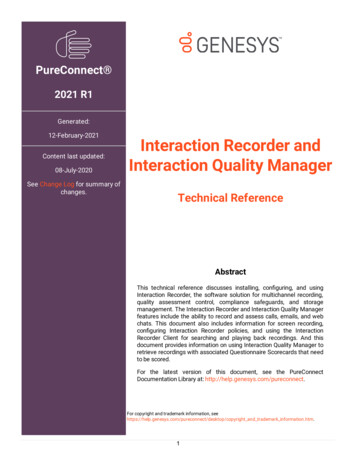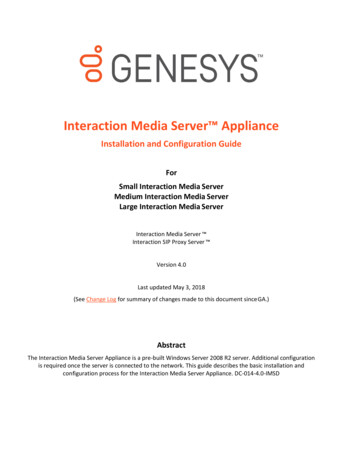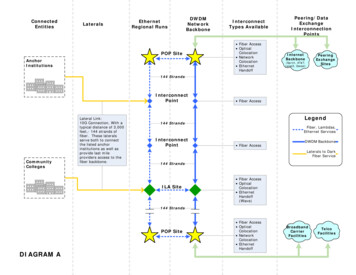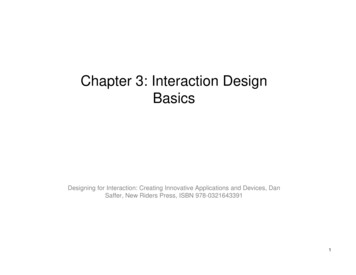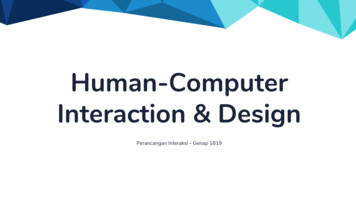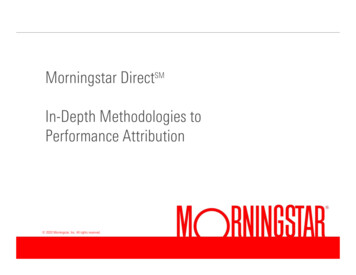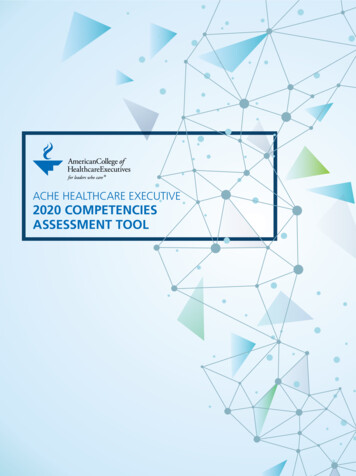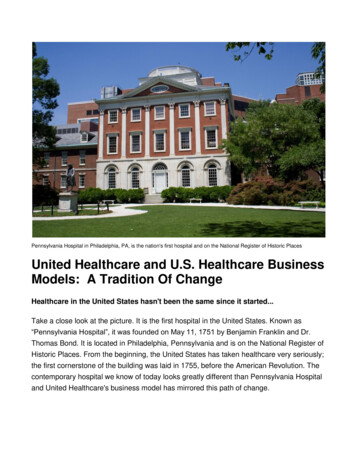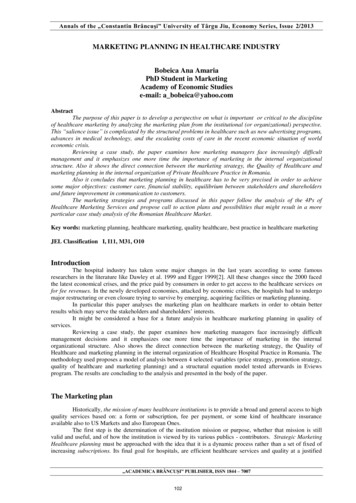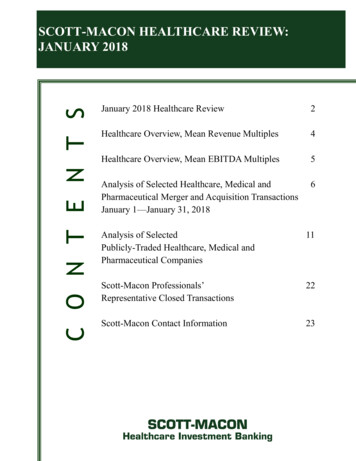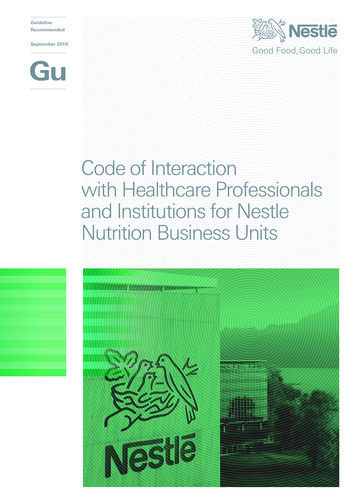
Transcription
GuidelineRecommendedSeptember 2019Code of Interactionwith Healthcare Professionalsand Institutions for NestleNutrition Business Units
GuidelineRecommendedIssuing departmentB-Nutrition, Corporate Governance & Compliance, Global Public AffairsSeptember 2019Target audienceAll employees, interested members of the publicApproverGlobal WHO Code Compliance CommitteeRepositoryAll Nestlé Principles and Policies, Standards and Guidelinescan be found in NestleDocs, on the NestCopyright and confidentialityAll rights belong to Société des Produits Nestlé Ltd., Vevey, Switzerland. 2019, Société des Produits Nestlé Ltd.Note: In October 2019, this current Guideline replacedthe Guideline on Sponsorship of Health Workers and Institutionsfor Professional Development and Scientific Research.DesignSociété des Produits Nestlé Ltd., Corporate Identity & Design,Vevey, Switzerland
1.IntroductionWith 150 years of experience in infant and youngchild nutrition, we know that parents alwaystry to give their children the very best start, andthey deserve help and support. Parents shouldhave access to all the unbiased information andsupport they need to make informed nutritionalchoices.For that reason, Healthcare Professionals(HCP) and Healthcare Institutions (HCI) play anessential role in improving the nutrition of infantsand young children. They guide and influencebabies’ feeding practices when they can provideobjective, updated science-based advice aboutbreastfeeding, weaning and appropriate nutrition.Accurately informed health workers can helpparents to understand what is best for theirpersonal situation and their baby’s nutritionalneeds when they are not breastfed. The WHOInternational Code of Marketing of BreastMilk Substitutes (WHO Code) and all relevantsubsequent World Health Assembly (WHA)resolutions acknowledge this.They highlight the importance of updatinghealth workers on infant nutrition productsdeveloped or improved by manufacturers, andrequire that the information given by companiesabout their products is objective, scientific andfactual, and does not imply that bottle-feeding isequivalent or superior to breast-feeding.Healthcare professionals should regularlyupdate their knowledge of nutritional scienceand research. However, not all public healthadministration, medical society or healthcareprofessionals have the resources to attendeducational conferences and congresses.The private sector provides important supportby offering science-based nutrition information2.to these audiences. With clear guidelinesand policies in place to ensure transparencyand eliminate conflicts of interest, healthcareprofessionals can stay up-to-date on maternal,infant and young child nutrition research, whichin turn can benefit the health and nutrition of theirpatients.Interaction with healthcare system workerscan take many forms. Symposia, congresses andother scientific events help disseminate relevantscientific or clinical knowledge and experienceto and between health workers. Information ontranslating the latest Research & Developmentinto new technology (or the evolution of productproperties) may also be shared with healthworkers within the framework of professionalmeetings.This is not only a one way flow of information.We need to collaborate with leading universitiesand research institutes worldwide and establishappropriate interactions with the scientificand medical community, to help us developproducts with the best science and innovation.Such cooperation can provide an importantcontribution towards manufacturing infantnutrition products that are: science-based; supported by sound clinical validations; endorsed by scientists and health practitioners.We benefit from the knowledge of the medicalcommunity as much as it benefits from us. Thisultimately benefits mothers and babies and this ishow we can contribute to providing optimal nutrition in the first 1000 days of life.Scope and ResponsibilitiesThis Code of Interaction with HealthcareProfessionals and Institutions for Nestle NutritionBusiness Units (HCP Code) sets the principles forinteractions between our Nutrition Business Unitsand the healthcare system.Where these interactions relate to breastmilksubstitutes, these guidelines complement therelevant sections of the Policy and Proceduresfor the Implementation of the WHO Code on themarketing of breastmilk substitutes (“the Policy andProcedures”), with more detailed guidance on howNestlé interacts with health workers and institutions.This HCP Code applies to all Nutritionbusinesses 1 in both high and lower risk countriesand include infant and maternal nutrition.All employees working in the Nutritionbusinesses, engaged in or supporting educational1) Nutrition businesses refers to all Nutrition business unitsbut does not include Nestlé Health Science businessunits.Code of Interaction with Healthcare Professionals and Institutions for Nestle Nutrition Business Units1
activities and interactions with HealthcareProfessionals and Institutions are responsible forreading, under standing, and complying with thisHCP Code.In addition, the Management Responsibilitiesset out in the Policy and Procedures apply.3.Principles of EngagementOur strong, compelling principles help us act inthe best interests of mothers and babies:–– We are committed to support breastfeeding asthe ideal nutrition for babies. We recommendbreast feeding over all other feedingalternatives;–– Every child has the right to the best possiblefirst 1000 days of life;–– Caregivers should have access to the highestquality solutions for the range of choices theymay make;–– All solutions must be rooted in current, highquality nutritional and behavioral science;–– All mums should feel respected and at peacewith their decision about how to feed theirbaby;–– Achieving the best possible nutritionaloutcomes requires responsible engagementand advocacy with all stakeholders;–– These principles apply equally, everywhere.Based on these principles, it is paramount that theultimate purpose of interactions with HealthcareProfessionals is to enhance the practice of medicine in line with the aim of the WHO Code (art.1):–– to contribute to the provision of safe andadequate nutrition for infants, by the protectionand promotion of breastfeeding, and by ensuringthe proper use of breast milk substitutes, whenthese are necessary, on the basis of adequateinformation and through appropriate marketingand distribution.All interactions must comply with applicable locallaws, regulations and industry codes and theprinciples set forth in the Policy and Procedures.In the event of a conflict between HCP code andlocal applicable laws, regulations and industrycodes or the Nestlé Policy and Procedures, themore restrictive provision applies.Guided by our adherence to the WHO Code,through our Policy and Procedures which definethe conditions of interaction with healthcareworkers and the healthcare system, we will 2:–– emphasize the superiority of breastfeeding,the WHO Code and give objective informationon scientific and factual matters pertaining toformula and its correct use. Claims must notimply that products, or an active ingredient, hassome special merit, quality or property unlessthis can be substantiated.–– not provide financial or material inducementsto healthcare workers or members of theirfamilies to promote breastmilk substitutes asdefined by the local legislation or our Policy andProcedures whichever is stricter;–– inform transparently the healthcare workers’institutions about contributions for fellowships,study tours, research grants, attendance atprofessional conferences or the like.Interactions with Healthcare Professionals byemployees in the Nutrition division must be consistent with the duties that Healthcare Professionals have to their patients or clients. At all times,these interactions must be ethical, appropriate andprofessional and should not create any conflict ofinterest.2) Please refer to art. 7.2, 7.3 and 7.5 of the Nestlé Policy andProcedures.2Code of Interaction with Healthcare Professionals and Institutions for Nestle Nutrition Business Units
4.Code of PracticeEvents, professional meetings andhospitalityHealthcare Professionals attendance at events(organized by Nutrition businesses or third parties)will be linked to the scientific and medical aspectsof nutrition and health of women of child-bearingage, infants and young children. They couldencompass good nutrition of mothers, optimalbreastfeeding, appropriate use of breastmilksubstitutes when children are not breastfed,adequate introduction of complementary food,and/or supporting the professional development ofhealth workers, with the aim of improving qualityof care, notably through better nutrition educationand the development of the best products.Sponsorship to attend an event must not be areward to a favored health worker or institution, oran inducement to recommend, prescribe or purchase our breast-milk substitutes or related services (including recommending in general breastmilk substitutes over breastfeeding). The sponsorship does not require or imply endorsement bythe recipients of Nestlé’s policies or activities.The activity and the sponsorship should be disclosed by Nestlé to the institution (or professionalassociation if applicable) to which the healthworker is affiliated. Conflicts of interests must beavoided.Thus, we shall not organize or sponsor an eventunless the following requirements are met:–– Sponsorship of health workers is limited to thepayment of travel, meals, accommodation andregistration fees;–– No payments are made to compensate healthworkers for time spent in attending the event;–– No payments are made in relation to costsassociated with individuals accompanyinginvited health workers, unless such individuals independently qualify for payment of suchcosts. Therefore, spouses and other accompanying persons may not attend the actualmeeting and may not receive any associatedhospitality at the company’s expense; theentire costs which their presence involves arethe responsibility of those they accompany.We will not organize or sponsor an event that takesplace outside a Nestlé entity’s home country unless:–– a significant portion of the invited HCPs arefrom outside the Nestlé entity’s country andit makes greater logistical or security sense tohold the event in another country; or–– the relevant resource or expertise that is theobject or subject matter of the event is locatedoutside the country of the Nestlé entity.Hospitality shall be limited to refreshments and/or meals incidental to the main purpose of theevent and shall only be provided to participantsof the event. As a general rule, the hospitalityprovided may not exceed what health workerrecipients would normally be prepared to pay forthemselves, taking into account the local context,and should not take place in a lavish or extravagant venue. Instead, locations and venues mustbe conducive to the main purpose of the eventand must not be renowned for their entertainmentactivities.No stand-alone entertainment or other leisureor social activities shall be provided or paid for,including but not limited to: golf, sporting events,concerts, theatre or other live entertainment,paying the cover charge for a bar or a club, spatreatment, sightseeing tours etc.Professional meetings organized withHealthcare Professionals to disseminateobjective, factual and science-based informationon products or solutions pertaining to infantand young children nutrition shall be held in anappropriate venue that are conducive to the mainpurpose of the event or meeting. Extravagantvenues are to be avoided.Third party conferences: Nutrition businesses and their entities may support with financial or material contribution the organization ofindependent educational and scientific conferences and meetings. The purpose of such thirdparty events must be to provide scientific or educational information. Such conferences shouldbe generally recognized and respected withinthe medical community and relate to Nutritionin the first 1000 days of life. Such support mustbe disclosed, as required. Hospitality provided inconnection to the event must be appropriate andwill not include Nutrition businesses support ororganization of entertainment events (i.e. leisure,sporting events, theatres ).Consulting arrangements with healthworkersNestlé may enter into bona fide consultingarrangements with health workers for the legitimate purposes set out in this document.A legitimate need and scope for the servicesof a Healthcare Professional must be clearlyidentified in advance of commencing the servicesor entering into contractual arrangements for theservices.Health workers who provide genuine advisoryservices under bona fide consulting arrangements may be offered reasonable, fair-marketcompensation for those services and reimburse-Code of Interaction with Healthcare Professionals and Institutions for Nestle Nutrition Business Units3
ment for reasonable travel, lodging and mealexpenses incurred as part of providing thoseservices.Research, academic activities andscholarshipsNestlé may provide funds to support genuineindependent research, advancement of scienceor education, or patient and public education inrelation to maternal, infant and young child nutrition.Research may also be initiated and organized by auniversity or a recognized third party institute.We may also sponsor health workers to benefitfrom academic activities. Activities might includefunding of attendance at a course or seminar orfunding for further education, such as fellowships, study tours and research grants. Decisionsto fund academic activities must be solely basedon their academic merits (such as their relevanceto the health care profession) and the inherentbona fide interests in advancing education orscience-based knowledge. Any contributionsmade must follow a clearly defined process andmust not represent endorsement of, or create theimpression of such endorsement of Nestlé’s activities or infant nutrition products by the recipient.Donations and Grants (in cash or in kindor otherwise) to HCI are only allowed if:–– they are made for the purpose of supportinghealthcare, research or education;–– they are documented and kept on record bythe donor/grantor;–– they do not constitute an inducement torecommend and/or prescribe, purchase,supply, sell or administer specific MedicinalProducts.Donations and Grants to individuals are notpermitted.DonationsProducts for professional evaluation 5Nutrition employees must not attempt to useitems of significant value and any type of incentives to influence the prescribing, dispensing,supplying, purchasing, administering, recommendation, or use of a breastmilk substitute. TheHealthcare Professional’s decision to prescribeor recommend a particular breastmilk substitutemust be based first and foremost on an evaluationof the available medical science and the need ofmothers and babies.The following types of donations pursue alegitimate purpose and are in accordance with theprinciple set out above:In higher risk countries, samples of breastmilksubstitutes as defined by the local legislationand/or the Policy and Procedures or equipmentor utensils for their prepara tion or use, may notbe provided to healthcare workers except for thepurpose of professional evaluation and only in thefollowing instances:–– to introduce a new breastmilk substitute asdefined by the local legislation and/or thePolicy and Procedures product;–– to introduce a new formulation of an existingproduct;–– to introduce our breastmilk substitutes rangeto a new or recently certified healthcareprofessional, as defined by the local legislationand/or the Policy and Procedures.Equipment and items of professional utility 3may not be used as an inducement to sell or prescribe products. If allowed by local regulationsand consistent with company policies, items ofprofessional utility may be provided to healthcare workers and other professionals working forhealthcare institutions. These must be reasonable, modest and appropriate and must not createthe appearance of improper influence or illegitimate advantage. In higher risk countries, suchequipment may not bear a brand of a breastmilksubstitute as defined by the local legislation and/or the Policy and Procedures .Educational items 4: where permitted by locallegislation and/or Nestlé Policy and Procedures,Nutrition employees may give educational items(e.g. education charts, breastfeeding booklets,4growth charts and videos) to Healthcare Professionals that are intended for the education ofhealthcare professionals or patients. Educationalitems must not have a value to a HCP outsidethe scope of his or her professional practice. Inhigher risk countries they should not name brandsor contain BMS brand logos of a breastmilk substitute as defined by the local legislation and/or the Policy and Procedures and such materialmay only be made available to healthcare institutions and professionals upon their request andin accordance with any applicable governmentrequirements or guidelines.In these cases, a maximum of two cans may begiven to a healthcare worker for this purpose andone time only. Product may also be provided forresearch or clinical evaluation, subject to completion of a research protocol. Clinical validationsare not to be used as a sales inducement and aresubject to detailed internal rules. These productsused for evaluation/clinical validation/research arerequired to be identified by stickers mentioning“Formula provided for evaluation/clinical validation/research – Not for Resale.”3) Please refer to art. 6.8 of the Policy and Procedures.4) Please refer to art. 4.3 of the Policy and Procedures.5) Please refer to art. 7.4 of the Policy and Procedures.Code of Interaction with Healthcare Professionals and Institutions for Nestle Nutrition Business Units
5.Reporting a violationNestlé employees and the General Public areencouraged to speak up and report actual orpotential violations of these Guidelines, the NestléPolicy and Procedures or applicable legislation.Our internal and external grievancemechanisms can be used to report violations. Ifyou are a Nestlé employee, you can:–– contact the Zone Nutrition ComplianceManager;–– contact the WHO Code Ombudsperson in yourmarket;–– use the Nestlé Integrity Reporting System, anexternally run channel available to employeesfor raising concerns anonymously about anyof our policies and procedures. The concernwill mandatorily be escalated to Global PublicAffairs and to the General Counsel – NutritionStrategic Business Unit.6.If you are not a Nestlé employee, you canreport your concern in the “Tell Us” system: itprovides all our external stakeholders with adedicated communication tool for reportingpotential instances of non-compliance withour Corporate Business Principles, policies andapplicable laws, including WHO Code relatedmatters. It is available worldwide 24 hours a day,7 days a week, on our global and all markets’corporate website. The concern will mandatorilybe escalated to Global Public Affairs and to theGeneral Counsel – Nutrition Strategic BusinessUnit.DefinitionsHealthcare workers or healthcare professionals (HCP) are doctors, pediatricians, nurses,midwives and other caregivers working in thearea of infant nutrition.Healthcare institutions (HCI) are understoodas the entity hiring healthcare professionals anddelivering healthcare services to mothers andbabies such as hospitals, clinics and dispensaries.Donations and Grants: funds, assets or servicesobtained for free by HCPs or HCIs for the purposeof supporting healthcare, scientific research oreducation. Donations or grants do not imply anyconsequent obligation for the HCP or the HCI tothe benefit of the donor in return.Sponsorship: is a support provided by or onbehalf of Nestlé, when permitted by law and asper these Guidelines as a contribution to supportan activity (including an event) performed, organized or created by a HCI, a medical association ora Third Party.Code of Interaction with Healthcare Professionals and Institutions for Nestle Nutrition Business Units5
and eliminate conflicts of interest, healthcare professionals can stay up-to-date on maternal, infant and young child nutrition research, which in turn can benefit the health and nutrition of their patients. Interaction with healthcare system workers can take many forms. Symposia, congres
